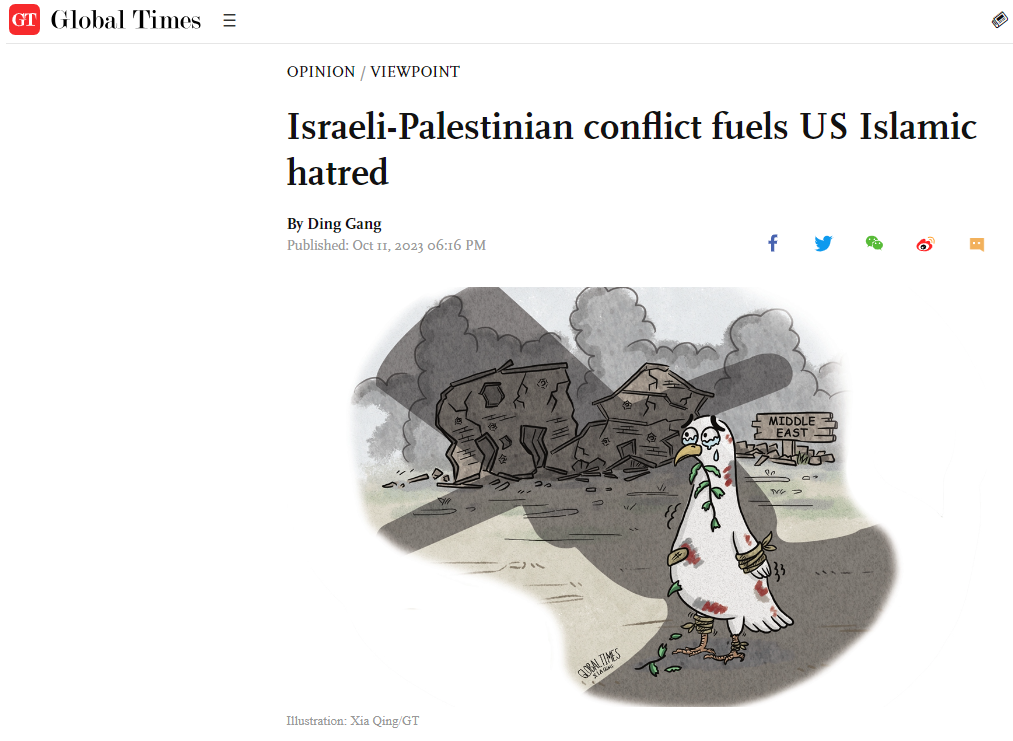LATEST INSIGHTS
Your Present Location: LATEST INSIGHTSDing Gang: Israeli-Palestinian conflict fuels US Islamic hatred
Source: GT Published: 2023-10-11

Hamas launched an "unprecedented" raid on Israel on October 7, and Israel quickly retaliated with harsh measures. The Middle East has been back in flames, resulting in the tragic deaths of thousands of civilians.
Washington condemned Hamas and expressed solidarity with Israel, promptly dispatching an aircraft carrier strike group to the Eastern Mediterranean in support of Israel. Nikki Haley, a Republican presidential contender and former US ambassador to the UN, urged Israeli Prime Minister Benjamin Netanyahu to "finish them," while Senate Majority Leader Chuck Schumer criticized China's initial response to the conflict that calls for calm and a two-state solution during his visit to China.
They reacted as if it were an attack on the US, reminiscent of the hate wave triggered by the 9/11 terrorist attacks in 2001.
It was at that time then president George W. Bush used the term "crusade" to describe the war on terror, which drew significant attention. The historical context of the word "crusade" highlights the perception of Christianity and Islam viewing each other as adversaries.
Zhou Yijun, a Chinese journalist who has worked in Gaza for several years, writes in her book The Door of Life and Death in the Middle East that the story of the Israeli-Palestinian conflict seems to be stuck in a loop. She argues that the dead end, in addition to the political complexity of the tussle, lies in the fact that the dominant narratives of the two opposing sides refuse to see the other as "human beings" and instead confine themselves to viewing the other as the devil.
The war on terror has proven that religious extremism has caused the US relationship with the Islamic world to fall into the trap of a "clash of civilizations."
Even after more than 20 years since 9/11, Americans have not moved past their anti-Muslim sentiment. The resumption of the war in the Middle East is likely to make this sentiment the central theme of American politics once again.
The timing selected by Hamas coincides with the US elections. The Israeli-Palestinian conflict will inevitably become significant for all candidates during the upcoming campaign. This allows right-wing or extreme right-wingers like Haley to seek additional votes by employing more divisive language in an already polarized political environment.
Some media outlets have noted that evangelical Christians, who support Israel for theological reasons, have become a prominent Republican constituency. Support for Israel has become the default stance for many Republican platforms.
According to estimates, there are approximately 3.45 million Muslims of all ages in the US, accounting for about 1.1 percent of the total US population. In recent years, there has been a noticeable rise in complaints regarding anti-Islamism, bias, and discrimination within the education system. A study conducted by a US Muslim group has unveiled a significant 72 percent increase in requests for assistance from parents and students facing an Islamophobia crisis in public schools specifically in Massachusetts.
Professor Samuel Huntington, the inventor of the "clash of civilizations" theory, said, "Some Westerners, including president Bill Clinton, have argued that the West does not have problems with Islam but only with violent Islamist extremists. Fourteen hundred years of history demonstrate otherwise. The relations between Islam and Christianity, both Orthodox and Western, have often been stormy. Each has been the other's Other."
Let's examine the current war in the Middle East in the context of the "coexistence" of Western and Muslim civilizations in the era of globalization. By doing so, we can understand why the conflict is bound to return.
Conflicts between the West and Islam are often driven by specific geopolitical circumstances, such as the Israeli-Palestinian conflict and the war in Iraq. These conflicts are not solely rooted in religious differences but are also influenced by various political and strategic considerations, including land and resources.
However, there is no doubt that clashes of religious values always play a role in these wars and contribute to escalation of conflicts, leading to a deepening sense of existential threat on both sides.
America's war on terror seems to have been successful, with Osama bin Laden being eliminated and Al Qaeda dismantled. But Haley's statement "finish them" reminds us that the hatred still persists. How can the US help the Middle East realize peace with such a deep hatred still intact?
US Secretary of State Antony Blinken will travel to Israel this week in show of support for Israel. But what is he supporting exactly? Is it a retaliatory mass killing?
The brutal killing comes with a price, so does encouraging others to kill.
The author is a senior editor with People's Daily, and currently a senior fellow with the Chongyang Institute for Financial Studies at Renmin University of China.
Key Words: Ding Gang, Israeli-Palestinian Conflict, US























































































 京公网安备 11010802037854号
京公网安备 11010802037854号





